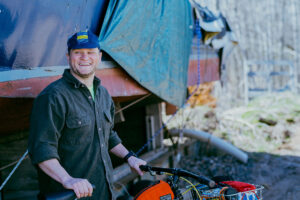UW-Superior
Associate Professor
Math and Computer Science
I am originally from upstate New York (near Ithaca!) and moved to Wisconsin (technically Minnesota!) after graduate school at Syracuse University in the summer of 2017. I am a commutative algebraist by training, so I study sets of numbers where xy and yx are equal to each other. But, my interests are vast both in mathematics and teaching in general. Here ar UWS I have spent the majority of my first 5 years adopting and refining my Standards Based Grading methods. I have spoken about this on-campus, at the system-level and at the regional level. I am also interested in machine learning and data science, and I have led several student senior projects around this topic.
Outside of mathematics and teaching I have a variety of interests: hiking and biking, cooking (especially beans and rice from around the world), and music. My wife and I are only a few years from our “see-saw” anniversary as I call it: the anniversary where we have been together longer than we were not.
TEACHING AND LEARNING PHILOSOPHY
My teaching philosophy is mostly that teaching should involve more revision/repetition and productive failure. I think that, at least in math, we still subscribe to a model of disseminating information and then checking student knowledge at a few cross-sections. We might notice some deficiencies at these checkpoints, but often there is no rectifying of these misunderstandings built in to the course structure. I have been trying to use my assessment style and class time to engage with students in the process of exposing what they don’t know yet, and then fixing that together. While it isn’t always comfortable (students often do not like being “wrong” even if there are no stakes) it has been productive.
Interestingly, I think this model of learning is present in many other places in life. Specifically, student-athletes understand that they learn sports by trying something, being bad at it for a while, and slowly being corrected by their coach/peers until they are doing it correctly (or “more effectively” in the case of a sport). I use formative completion-based assignments to refine student skills and revisable conceptual assignments to push their abilities past what I have already shown them. I want them to be able to use the larger meta-skills of math (doing examples to determine why a general fact is true, asking questions to determine whether all assumptions are necessary, etc), not just copy things I’ve done in class.
My philosophy is that students are capable of and understand so much; but, we often put to rigid of a framework on the way we assess what they know. To truly push student growth and learning we have to find better ways to allow them to express themselves intuitively and then slowly mold their means of expression to the task at hand.

